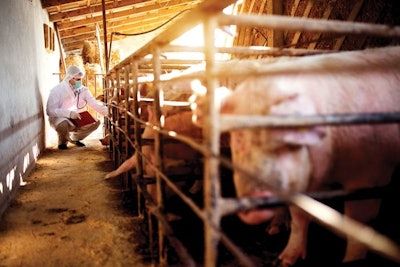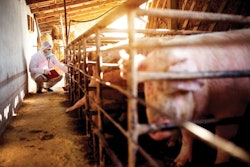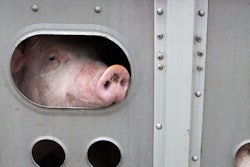
A new project recently got underway with the aim to develop an orally administered African swine fever (ASF) vaccine for the European market.
Titled ASFaVIP (ASF attenuated live Vaccines In Pigs), the new project is led by Dr. Sandra Blome of the German national veterinary agency, the Friedrich-Loeffler Institute (FLI).
Conventional disease control approaches based on biosecurity have been fairly successful in protecting Europe’s commercial pigs from ASF infections. However, it is recognized that these are ineffective when it comes to wild boar. It is hoped that the successes achieved with oral vaccines against classical swine fever can be replicated for ASF in the region’s wild population.
At a first meeting of the group, plans were agreed for the testing of existing experimental vaccines, as well as future methodological approaches.
Funded by the European Union, the FLI-led project includes main partners from Belgium, France, Germany, The Netherlands and Spain. Furthermore, associated partners have joined from Switzerland and the United States, and Zoetis is the industrial partner.
Last month, the Pirbright Institute in the United Kingdom announced a new project aimed at combating the devastating effects of ASF in Africa.
With new funding from the Medical Research Council, the group will explore further how a promising modified live vaccine candidate against the genotype II ASF virus works, and whether it is effective against the other 23 virus genotypes known to be present on the African continent.
3 European nations report new outbreaks in pigs
So far in 2024, 90 ASF outbreaks have been confirmed in domestic swine in eight of the region’s states, according to the latest update from the European Commission (EC; as of April 12). The EC’s Animal Disease Information System covers notifiable animal diseases in European Union (EU) member states, and selected adjacent states.
Compared with the previous edition one week earlier, this total represents a rise of six outbreaks.
Registering the most outbreaks in this category for the year to date is Romania — now with 29 — followed by Serbia with 28. Both of these countries registered increases since the previous edition, as did Greece, whose total now stands at three up to this point in 2024.
For comparison, the EC recorded a total of 4,513 outbreaks in this population in 16 European states in 2023.
Further detail on some of these developments is included in official notifications from the national animal health agencies to the World Organisation for Animal Health (WOAH).
Four recent outbreaks in Romania each involved small backyard herds, all in different counties across the country. A total of 27 pigs were involved in these outbreaks.
In the first week of April, presence of the ASF virus was confirmed at a farm in Greece after two of the 192 animals died. This outbreak in Central Macedonia brings to three the number of the country’s farms with reported ASF cases so far this year. It occurred in the same area as the previous outbreak, which began two months earlier.
ASF outbreak total in European wild boar passes 2,600
Since the EC’s previous update dated April 5, total ASF outbreaks in the wild boar population so far this year have risen by 131 to 2,616. This is the total according to the EC System, as of April 12. In 2024, cases have been recorded in 20 European states monitored by the system.
For comparison, the wild boar outbreak total recorded by the EC in 2023 was 7,903 — also in 20 countries.
In the latest system update, Poland continues to have the highest outbreak total for the year to date at 593. Next come Italy (544), Bulgaria (446), Latvia (232), Lithuania (201), Hungary (165) and Romania (93).
With the exception of Latvia, all of these states reported further cases in wild boar since the April 5 update, as did Germany, Greece, Lithuania, Romania, Serbia, Slovakia and Ukraine.
Furthermore, Sweden detected one further cases of ASF in its wild boar population this month. According to the WOAH notification, the positive test results came from the remains of the long-dead animal found in the same zone as previous cases.
According to Sweden’s national veterinary institute, SVA, the animal may have died as long ago as August 2023. As the winter snow melts, it says that more infected carcasses may be revealed in the region. This latest case brings the total cases in the Swedish wild population since September 2023 to 63.
In Italy, new ASF outbreaks in wild boar have been confirmed in seven provinces. This is according to the regional veterinary authority IZSAM as of April 18, and compared with the situation eight days earlier.
One of the latest cases was in the southern region of Campania after a near two-month hiatus. The remaining 56 new outbreaks were in the more northerly regions of Emilia-Romagna, Liguria, Lombardy and Piedmont.
View our continuing coverage of the global African swine fever situation.
















